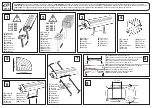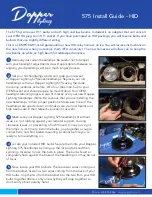
Securing the child restraint system with the seat
&
WARNING Risk of accident if the rear
bench seat, rear seat and seat backrest
are not engaged
The rear bench seat, rear seat and seat back-
rest may fold forwards, even while the vehicle
is in motion.
R
As a result, the vehicle occupant will be
pressed into the seat belt with increased
force. The seat belt will not be able to pro-
tect as intended and could cause addi-
tional injury.
R
Objects or loads in the boot or load com-
partment cannot be restrained by the seat
backrest.
#
Make sure that the rear bench seat, the
rear seat and the seat backrest are
engaged before every trip.
If the rear seat backrest is not engaged and
locked in place, the red lock verification indicator
will be visible.
When fitting a belt-secured child restraint system,
observe the following:
O
Always comply with the manufacturer's
installation and operating instructions for the
child restraint system used.
O
For a child restraint system in the "Universal"
or "Semi-Universal" category, make sure that
the system has been approved for the vehicle
seat.
Observe the notes under "Suitability of seats
for attaching belt-secured child restraint sys-
tems" (
/
page 74).
O
When using a weight category 0/0+ baby
car seat and a weight category I rearward-
facing child restraint system on a rear seat:
adjust the front seat so that the seat does
not touch the child restraint system.
O
When using a weight category I forward-
facing child restraint system: remove the
head restraint from the respective seat, if
possible.
After the child restraint system has been
removed, replace the head restraint immedi-
ately and adjust all head restraints correctly.
O
The backrest of the forward-facing child
restraint system must, as far as possible, be
resting on the seat backrest of the rear seat.
O
If the head restraint of the child seat cannot
be fully extended when it is installed in the
vehicle, this will result in restrictions on the
maximum size setting for child restraint sys-
tems in weight category II or III.
Contact with the roof when the head
restraint is fully extended and locked in place
will not result in any restrictions on use.
O
The child restraint system must not be put
under strain between the roof and the seat
cushion and/or be fitted facing the wrong
direction. Where possible, adjust the seat
cushion inclination accordingly.
O
The child restraint system must not be put
under strain by the head restraint. Adjust the
head restraints as appropriate.
O
Make sure that the child's feet do not touch
the front seat. If necessary, move the front
seat slightly forwards.
76
Occupant safety
Summary of Contents for EQA 2022
Page 9: ...Left hand drive vehicles 6 At a glance Cockpit...
Page 11: ...R Opens the bonnet 346 S Electric parking brake 224 T Light switch 142 8 At a glance Cockpit...
Page 12: ......
Page 13: ...Left hand drive vehicles 10 At a glance Cockpit plug in hybrid...
Page 15: ...Standard instrument display 12 At a glance Indicator and warning lamps standard...
Page 19: ...16 At a glance Overhead control panel...
Page 21: ...18 At a glance Door operating unit and seat adjustment...
Page 23: ...20 At a glance Emergencies and breakdowns...
















































